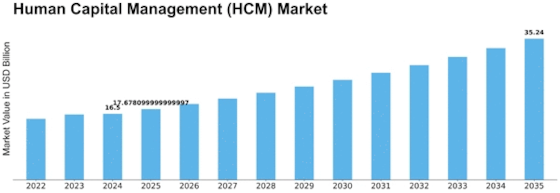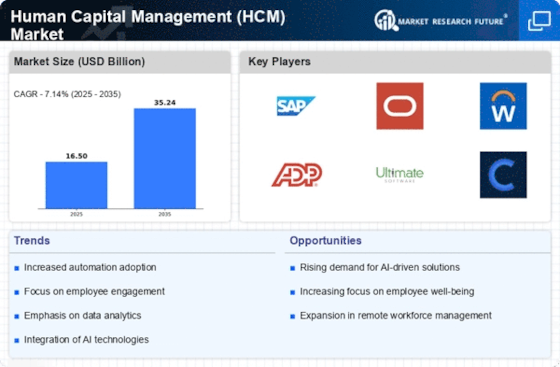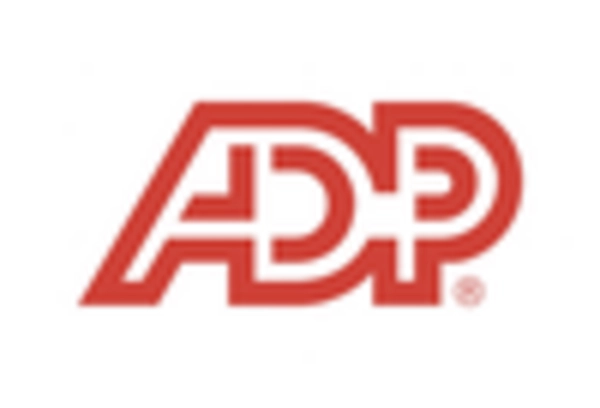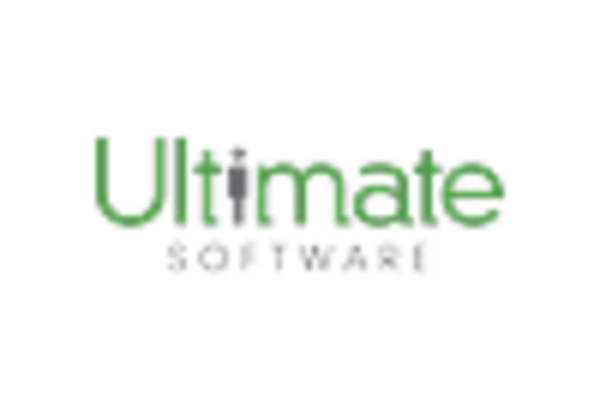-
EXECUTIVE SUMMARY
-
Market Overview
-
Key Findings
-
Market Segmentation
-
Competitive Landscape
-
Challenges and Opportunities
-
Future Outlook
-
MARKET INTRODUCTION
-
Definition
-
Scope of the study
-
Research Objective
-
Assumption
-
Limitations
-
RESEARCH METHODOLOGY
-
Overview
-
Data Mining
-
Secondary Research
-
Primary Research
-
Primary Interviews and Information Gathering Process
-
Breakdown of Primary Respondents
-
Forecasting Model
-
Market Size Estimation
-
Bottom-Up Approach
-
Top-Down Approach
-
Data Triangulation
-
Validation
-
MARKET DYNAMICS
-
Overview
-
Drivers
-
Restraints
-
Opportunities
-
MARKET FACTOR ANALYSIS
-
Value chain Analysis
-
Porter's Five Forces Analysis
-
Bargaining Power of Suppliers
-
Bargaining Power of Buyers
-
Threat of New Entrants
-
Threat of Substitutes
-
Intensity of Rivalry
-
COVID-19 Impact Analysis
-
Market Impact Analysis
-
Regional Impact
-
Opportunity and Threat Analysis
-
Human Capital Management (HCM) Market, BY Solution Type (USD Billion)
-
Core HCM
-
Talent Management
-
Workforce Management
-
Recruitment
-
Learning Management
-
Human Capital Management (HCM) Market, BY Deployment Type (USD Billion)
-
Cloud-Based
-
On-Premises
-
Hybrid
-
Human Capital Management (HCM) Market, BY Organization Size (USD Billion)
-
SMEs
-
Large Enterprises
-
Human Capital Management (HCM) Market, BY Industry Vertical (USD Billion)
-
Healthcare
-
Retail
-
IT and Telecom
-
Manufacturing
-
Education
-
Human Capital Management (HCM) Market, BY Regional (USD Billion)
-
North America
-
US
-
Canada
-
Europe
-
Germany
-
UK
-
France
-
Russia
-
Italy
-
Spain
-
Rest of Europe
-
APAC
-
China
-
India
-
Japan
-
South Korea
-
Malaysia
-
Thailand
-
Indonesia
-
Rest of APAC
-
South America
-
Brazil
-
Mexico
-
Argentina
-
Rest of South America
-
MEA
-
GCC Countries
-
South Africa
-
Rest of MEA
-
Competitive Landscape
-
Overview
-
Competitive Analysis
-
Market share Analysis
-
Major Growth Strategy in the Human Capital Management (HCM) Market
-
Competitive Benchmarking
-
Leading Players in Terms of Number of Developments in the Human Capital Management (HCM) Market
-
Key developments and growth strategies
-
New Product Launch/Service Deployment
-
Merger & Acquisitions
-
Joint Ventures
-
Major Players Financial Matrix
-
Sales and Operating Income
-
Major Players R&D Expenditure. 2023
-
Company Profiles
-
Workday
-
Financial Overview
-
Products Offered
-
Key Developments
-
SWOT Analysis
-
Key Strategies
-
Infor
-
Financial Overview
-
Products Offered
-
Key Developments
-
SWOT Analysis
-
Key Strategies
-
Zenefits
-
Financial Overview
-
Products Offered
-
Key Developments
-
SWOT Analysis
-
Key Strategies
-
SAP
-
Financial Overview
-
Products Offered
-
Key Developments
-
SWOT Analysis
-
Key Strategies
-
Ultimate Software
-
Financial Overview
-
Products Offered
-
Key Developments
-
SWOT Analysis
-
Key Strategies
-
Gusto
-
Financial Overview
-
Products Offered
-
Key Developments
-
SWOT Analysis
-
Key Strategies
-
Payscale
-
Financial Overview
-
Products Offered
-
Key Developments
-
SWOT Analysis
-
Key Strategies
-
Ceridian
-
Financial Overview
-
Products Offered
-
Key Developments
-
SWOT Analysis
-
Key Strategies
-
ADP
-
Financial Overview
-
Products Offered
-
Key Developments
-
SWOT Analysis
-
Key Strategies
-
BambooHR
-
Financial Overview
-
Products Offered
-
Key Developments
-
SWOT Analysis
-
Key Strategies
-
Kronos
-
Financial Overview
-
Products Offered
-
Key Developments
-
SWOT Analysis
-
Key Strategies
-
Sage
-
Financial Overview
-
Products Offered
-
Key Developments
-
SWOT Analysis
-
Key Strategies
-
SuccessFactors
-
Financial Overview
-
Products Offered
-
Key Developments
-
SWOT Analysis
-
Key Strategies
-
Paychex
-
Financial Overview
-
Products Offered
-
Key Developments
-
SWOT Analysis
-
Key Strategies
-
Oracle
-
Financial Overview
-
Products Offered
-
Key Developments
-
SWOT Analysis
-
Key Strategies
-
Appendix
-
References
-
Related Reports
-
LIST Of tables
-
LIST OF ASSUMPTIONS
-
North America Human Capital Management (HCM) Market SIZE ESTIMATES & FORECAST, BY SOLUTION TYPE, 2019-2035 (USD Billions)
-
North America Human Capital Management (HCM) Market SIZE ESTIMATES & FORECAST, BY DEPLOYMENT TYPE, 2019-2035 (USD Billions)
-
North America Human Capital Management (HCM) Market SIZE ESTIMATES & FORECAST, BY ORGANIZATION SIZE, 2019-2035 (USD Billions)
-
North America Human Capital Management (HCM) Market SIZE ESTIMATES & FORECAST, BY INDUSTRY VERTICAL, 2019-2035 (USD Billions)
-
North America Human Capital Management (HCM) Market SIZE ESTIMATES & FORECAST, BY REGIONAL, 2019-2035 (USD Billions)
-
US Human Capital Management (HCM) Market SIZE ESTIMATES & FORECAST, BY SOLUTION TYPE, 2019-2035 (USD Billions)
-
US Human Capital Management (HCM) Market SIZE ESTIMATES & FORECAST, BY DEPLOYMENT TYPE, 2019-2035 (USD Billions)
-
US Human Capital Management (HCM) Market SIZE ESTIMATES & FORECAST, BY ORGANIZATION SIZE, 2019-2035 (USD Billions)
-
US Human Capital Management (HCM) Market SIZE ESTIMATES & FORECAST, BY INDUSTRY VERTICAL, 2019-2035 (USD Billions)
-
US Human Capital Management (HCM) Market SIZE ESTIMATES & FORECAST, BY REGIONAL, 2019-2035 (USD Billions)
-
Canada Human Capital Management (HCM) Market SIZE ESTIMATES & FORECAST, BY SOLUTION TYPE, 2019-2035 (USD Billions)
-
Canada Human Capital Management (HCM) Market SIZE ESTIMATES & FORECAST, BY DEPLOYMENT TYPE, 2019-2035 (USD Billions)
-
Canada Human Capital Management (HCM) Market SIZE ESTIMATES & FORECAST, BY ORGANIZATION SIZE, 2019-2035 (USD Billions)
-
Canada Human Capital Management (HCM) Market SIZE ESTIMATES & FORECAST, BY INDUSTRY VERTICAL, 2019-2035 (USD Billions)
-
Canada Human Capital Management (HCM) Market SIZE ESTIMATES & FORECAST, BY REGIONAL, 2019-2035 (USD Billions)
-
Europe Human Capital Management (HCM) Market SIZE ESTIMATES & FORECAST, BY SOLUTION TYPE, 2019-2035 (USD Billions)
-
Europe Human Capital Management (HCM) Market SIZE ESTIMATES & FORECAST, BY DEPLOYMENT TYPE, 2019-2035 (USD Billions)
-
Europe Human Capital Management (HCM) Market SIZE ESTIMATES & FORECAST, BY ORGANIZATION SIZE, 2019-2035 (USD Billions)
-
Europe Human Capital Management (HCM) Market SIZE ESTIMATES & FORECAST, BY INDUSTRY VERTICAL, 2019-2035 (USD Billions)
-
Europe Human Capital Management (HCM) Market SIZE ESTIMATES & FORECAST, BY REGIONAL, 2019-2035 (USD Billions)
-
Germany Human Capital Management (HCM) Market SIZE ESTIMATES & FORECAST, BY SOLUTION TYPE, 2019-2035 (USD Billions)
-
Germany Human Capital Management (HCM) Market SIZE ESTIMATES & FORECAST, BY DEPLOYMENT TYPE, 2019-2035 (USD Billions)
-
Germany Human Capital Management (HCM) Market SIZE ESTIMATES & FORECAST, BY ORGANIZATION SIZE, 2019-2035 (USD Billions)
-
Germany Human Capital Management (HCM) Market SIZE ESTIMATES & FORECAST, BY INDUSTRY VERTICAL, 2019-2035 (USD Billions)
-
Germany Human Capital Management (HCM) Market SIZE ESTIMATES & FORECAST, BY REGIONAL, 2019-2035 (USD Billions)
-
UK Human Capital Management (HCM) Market SIZE ESTIMATES & FORECAST, BY SOLUTION TYPE, 2019-2035 (USD Billions)
-
UK Human Capital Management (HCM) Market SIZE ESTIMATES & FORECAST, BY DEPLOYMENT TYPE, 2019-2035 (USD Billions)
-
UK Human Capital Management (HCM) Market SIZE ESTIMATES & FORECAST, BY ORGANIZATION SIZE, 2019-2035 (USD Billions)
-
UK Human Capital Management (HCM) Market SIZE ESTIMATES & FORECAST, BY INDUSTRY VERTICAL, 2019-2035 (USD Billions)
-
UK Human Capital Management (HCM) Market SIZE ESTIMATES & FORECAST, BY REGIONAL, 2019-2035 (USD Billions)
-
France Human Capital Management (HCM) Market SIZE ESTIMATES & FORECAST, BY SOLUTION TYPE, 2019-2035 (USD Billions)
-
France Human Capital Management (HCM) Market SIZE ESTIMATES & FORECAST, BY DEPLOYMENT TYPE, 2019-2035 (USD Billions)
-
France Human Capital Management (HCM) Market SIZE ESTIMATES & FORECAST, BY ORGANIZATION SIZE, 2019-2035 (USD Billions)
-
France Human Capital Management (HCM) Market SIZE ESTIMATES & FORECAST, BY INDUSTRY VERTICAL, 2019-2035 (USD Billions)
-
France Human Capital Management (HCM) Market SIZE ESTIMATES & FORECAST, BY REGIONAL, 2019-2035 (USD Billions)
-
Russia Human Capital Management (HCM) Market SIZE ESTIMATES & FORECAST, BY SOLUTION TYPE, 2019-2035 (USD Billions)
-
Russia Human Capital Management (HCM) Market SIZE ESTIMATES & FORECAST, BY DEPLOYMENT TYPE, 2019-2035 (USD Billions)
-
Russia Human Capital Management (HCM) Market SIZE ESTIMATES & FORECAST, BY ORGANIZATION SIZE, 2019-2035 (USD Billions)
-
Russia Human Capital Management (HCM) Market SIZE ESTIMATES & FORECAST, BY INDUSTRY VERTICAL, 2019-2035 (USD Billions)
-
Russia Human Capital Management (HCM) Market SIZE ESTIMATES & FORECAST, BY REGIONAL, 2019-2035 (USD Billions)
-
Italy Human Capital Management (HCM) Market SIZE ESTIMATES & FORECAST, BY SOLUTION TYPE, 2019-2035 (USD Billions)
-
Italy Human Capital Management (HCM) Market SIZE ESTIMATES & FORECAST, BY DEPLOYMENT TYPE, 2019-2035 (USD Billions)
-
Italy Human Capital Management (HCM) Market SIZE ESTIMATES & FORECAST, BY ORGANIZATION SIZE, 2019-2035 (USD Billions)
-
Italy Human Capital Management (HCM) Market SIZE ESTIMATES & FORECAST, BY INDUSTRY VERTICAL, 2019-2035 (USD Billions)
-
Italy Human Capital Management (HCM) Market SIZE ESTIMATES & FORECAST, BY REGIONAL, 2019-2035 (USD Billions)
-
Spain Human Capital Management (HCM) Market SIZE ESTIMATES & FORECAST, BY SOLUTION TYPE, 2019-2035 (USD Billions)
-
Spain Human Capital Management (HCM) Market SIZE ESTIMATES & FORECAST, BY DEPLOYMENT TYPE, 2019-2035 (USD Billions)
-
Spain Human Capital Management (HCM) Market SIZE ESTIMATES & FORECAST, BY ORGANIZATION SIZE, 2019-2035 (USD Billions)
-
Spain Human Capital Management (HCM) Market SIZE ESTIMATES & FORECAST, BY INDUSTRY VERTICAL, 2019-2035 (USD Billions)
-
Spain Human Capital Management (HCM) Market SIZE ESTIMATES & FORECAST, BY REGIONAL, 2019-2035 (USD Billions)
-
Rest of Europe Human Capital Management (HCM) Market SIZE ESTIMATES & FORECAST, BY SOLUTION TYPE, 2019-2035 (USD Billions)
-
Rest of Europe Human Capital Management (HCM) Market SIZE ESTIMATES & FORECAST, BY DEPLOYMENT TYPE, 2019-2035 (USD Billions)
-
Rest of Europe Human Capital Management (HCM) Market SIZE ESTIMATES & FORECAST, BY ORGANIZATION SIZE, 2019-2035 (USD Billions)
-
Rest of Europe Human Capital Management (HCM) Market SIZE ESTIMATES & FORECAST, BY INDUSTRY VERTICAL, 2019-2035 (USD Billions)
-
Rest of Europe Human Capital Management (HCM) Market SIZE ESTIMATES & FORECAST, BY REGIONAL, 2019-2035 (USD Billions)
-
APAC Human Capital Management (HCM) Market SIZE ESTIMATES & FORECAST, BY SOLUTION TYPE, 2019-2035 (USD Billions)
-
APAC Human Capital Management (HCM) Market SIZE ESTIMATES & FORECAST, BY DEPLOYMENT TYPE, 2019-2035 (USD Billions)
-
APAC Human Capital Management (HCM) Market SIZE ESTIMATES & FORECAST, BY ORGANIZATION SIZE, 2019-2035 (USD Billions)
-
APAC Human Capital Management (HCM) Market SIZE ESTIMATES & FORECAST, BY INDUSTRY VERTICAL, 2019-2035 (USD Billions)
-
APAC Human Capital Management (HCM) Market SIZE ESTIMATES & FORECAST, BY REGIONAL, 2019-2035 (USD Billions)
-
China Human Capital Management (HCM) Market SIZE ESTIMATES & FORECAST, BY SOLUTION TYPE, 2019-2035 (USD Billions)
-
China Human Capital Management (HCM) Market SIZE ESTIMATES & FORECAST, BY DEPLOYMENT TYPE, 2019-2035 (USD Billions)
-
China Human Capital Management (HCM) Market SIZE ESTIMATES & FORECAST, BY ORGANIZATION SIZE, 2019-2035 (USD Billions)
-
China Human Capital Management (HCM) Market SIZE ESTIMATES & FORECAST, BY INDUSTRY VERTICAL, 2019-2035 (USD Billions)
-
China Human Capital Management (HCM) Market SIZE ESTIMATES & FORECAST, BY REGIONAL, 2019-2035 (USD Billions)
-
India Human Capital Management (HCM) Market SIZE ESTIMATES & FORECAST, BY SOLUTION TYPE, 2019-2035 (USD Billions)
-
India Human Capital Management (HCM) Market SIZE ESTIMATES & FORECAST, BY DEPLOYMENT TYPE, 2019-2035 (USD Billions)
-
India Human Capital Management (HCM) Market SIZE ESTIMATES & FORECAST, BY ORGANIZATION SIZE, 2019-2035 (USD Billions)
-
India Human Capital Management (HCM) Market SIZE ESTIMATES & FORECAST, BY INDUSTRY VERTICAL, 2019-2035 (USD Billions)
-
India Human Capital Management (HCM) Market SIZE ESTIMATES & FORECAST, BY REGIONAL, 2019-2035 (USD Billions)
-
Japan Human Capital Management (HCM) Market SIZE ESTIMATES & FORECAST, BY SOLUTION TYPE, 2019-2035 (USD Billions)
-
Japan Human Capital Management (HCM) Market SIZE ESTIMATES & FORECAST, BY DEPLOYMENT TYPE, 2019-2035 (USD Billions)
-
Japan Human Capital Management (HCM) Market SIZE ESTIMATES & FORECAST, BY ORGANIZATION SIZE, 2019-2035 (USD Billions)
-
Japan Human Capital Management (HCM) Market SIZE ESTIMATES & FORECAST, BY INDUSTRY VERTICAL, 2019-2035 (USD Billions)
-
Japan Human Capital Management (HCM) Market SIZE ESTIMATES & FORECAST, BY REGIONAL, 2019-2035 (USD Billions)
-
South Korea Human Capital Management (HCM) Market SIZE ESTIMATES & FORECAST, BY SOLUTION TYPE, 2019-2035 (USD Billions)
-
South Korea Human Capital Management (HCM) Market SIZE ESTIMATES & FORECAST, BY DEPLOYMENT TYPE, 2019-2035 (USD Billions)
-
South Korea Human Capital Management (HCM) Market SIZE ESTIMATES & FORECAST, BY ORGANIZATION SIZE, 2019-2035 (USD Billions)
-
South Korea Human Capital Management (HCM) Market SIZE ESTIMATES & FORECAST, BY INDUSTRY VERTICAL, 2019-2035 (USD Billions)
-
South Korea Human Capital Management (HCM) Market SIZE ESTIMATES & FORECAST, BY REGIONAL, 2019-2035 (USD Billions)
-
Malaysia Human Capital Management (HCM) Market SIZE ESTIMATES & FORECAST, BY SOLUTION TYPE, 2019-2035 (USD Billions)
-
Malaysia Human Capital Management (HCM) Market SIZE ESTIMATES & FORECAST, BY DEPLOYMENT TYPE, 2019-2035 (USD Billions)
-
Malaysia Human Capital Management (HCM) Market SIZE ESTIMATES & FORECAST, BY ORGANIZATION SIZE, 2019-2035 (USD Billions)
-
Malaysia Human Capital Management (HCM) Market SIZE ESTIMATES & FORECAST, BY INDUSTRY VERTICAL, 2019-2035 (USD Billions)
-
Malaysia Human Capital Management (HCM) Market SIZE ESTIMATES & FORECAST, BY REGIONAL, 2019-2035 (USD Billions)
-
Thailand Human Capital Management (HCM) Market SIZE ESTIMATES & FORECAST, BY SOLUTION TYPE, 2019-2035 (USD Billions)
-
Thailand Human Capital Management (HCM) Market SIZE ESTIMATES & FORECAST, BY DEPLOYMENT TYPE, 2019-2035 (USD Billions)
-
Thailand Human Capital Management (HCM) Market SIZE ESTIMATES & FORECAST, BY ORGANIZATION SIZE, 2019-2035 (USD Billions)
-
Thailand Human Capital Management (HCM) Market SIZE ESTIMATES & FORECAST, BY INDUSTRY VERTICAL, 2019-2035 (USD Billions)
-
Thailand Human Capital Management (HCM) Market SIZE ESTIMATES & FORECAST, BY REGIONAL, 2019-2035 (USD Billions)
-
Indonesia Human Capital Management (HCM) Market SIZE ESTIMATES & FORECAST, BY SOLUTION TYPE, 2019-2035 (USD Billions)
-
Indonesia Human Capital Management (HCM) Market SIZE ESTIMATES & FORECAST, BY DEPLOYMENT TYPE, 2019-2035 (USD Billions)
-
Indonesia Human Capital Management (HCM) Market SIZE ESTIMATES & FORECAST, BY ORGANIZATION SIZE, 2019-2035 (USD Billions)
-
Indonesia Human Capital Management (HCM) Market SIZE ESTIMATES & FORECAST, BY INDUSTRY VERTICAL, 2019-2035 (USD Billions)
-
Indonesia Human Capital Management (HCM) Market SIZE ESTIMATES & FORECAST, BY REGIONAL, 2019-2035 (USD Billions)
-
Rest of APAC Human Capital Management (HCM) Market SIZE ESTIMATES & FORECAST, BY SOLUTION TYPE, 2019-2035 (USD Billions)
-
Rest of APAC Human Capital Management (HCM) Market SIZE ESTIMATES & FORECAST, BY DEPLOYMENT TYPE, 2019-2035 (USD Billions)
-
Rest of APAC Human Capital Management (HCM) Market SIZE ESTIMATES & FORECAST, BY ORGANIZATION SIZE, 2019-2035 (USD Billions)
-
Rest of APAC Human Capital Management (HCM) Market SIZE ESTIMATES & FORECAST, BY INDUSTRY VERTICAL, 2019-2035 (USD Billions)
-
Rest of APAC Human Capital Management (HCM) Market SIZE ESTIMATES & FORECAST, BY REGIONAL, 2019-2035 (USD Billions)
-
South America Human Capital Management (HCM) Market SIZE ESTIMATES & FORECAST, BY SOLUTION TYPE, 2019-2035 (USD Billions)
-
South America Human Capital Management (HCM) Market SIZE ESTIMATES & FORECAST, BY DEPLOYMENT TYPE, 2019-2035 (USD Billions)
-
South America Human Capital Management (HCM) Market SIZE ESTIMATES & FORECAST, BY ORGANIZATION SIZE, 2019-2035 (USD Billions)
-
South America Human Capital Management (HCM) Market SIZE ESTIMATES & FORECAST, BY INDUSTRY VERTICAL, 2019-2035 (USD Billions)
-
South America Human Capital Management (HCM) Market SIZE ESTIMATES & FORECAST, BY REGIONAL, 2019-2035 (USD Billions)
-
Brazil Human Capital Management (HCM) Market SIZE ESTIMATES & FORECAST, BY SOLUTION TYPE, 2019-2035 (USD Billions)
-
Brazil Human Capital Management (HCM) Market SIZE ESTIMATES & FORECAST, BY DEPLOYMENT TYPE, 2019-2035 (USD Billions)
-
Brazil Human Capital Management (HCM) Market SIZE ESTIMATES & FORECAST, BY ORGANIZATION SIZE, 2019-2035 (USD Billions)
-
Brazil Human Capital Management (HCM) Market SIZE ESTIMATES & FORECAST, BY INDUSTRY VERTICAL, 2019-2035 (USD Billions)
-
Brazil Human Capital Management (HCM) Market SIZE ESTIMATES & FORECAST, BY REGIONAL, 2019-2035 (USD Billions)
-
Mexico Human Capital Management (HCM) Market SIZE ESTIMATES & FORECAST, BY SOLUTION TYPE, 2019-2035 (USD Billions)
-
Mexico Human Capital Management (HCM) Market SIZE ESTIMATES & FORECAST, BY DEPLOYMENT TYPE, 2019-2035 (USD Billions)
-
Mexico Human Capital Management (HCM) Market SIZE ESTIMATES & FORECAST, BY ORGANIZATION SIZE, 2019-2035 (USD Billions)
-
Mexico Human Capital Management (HCM) Market SIZE ESTIMATES & FORECAST, BY INDUSTRY VERTICAL, 2019-2035 (USD Billions)
-
Mexico Human Capital Management (HCM) Market SIZE ESTIMATES & FORECAST, BY REGIONAL, 2019-2035 (USD Billions)
-
Argentina Human Capital Management (HCM) Market SIZE ESTIMATES & FORECAST, BY SOLUTION TYPE, 2019-2035 (USD Billions)
-
Argentina Human Capital Management (HCM) Market SIZE ESTIMATES & FORECAST, BY DEPLOYMENT TYPE, 2019-2035 (USD Billions)
-
Argentina Human Capital Management (HCM) Market SIZE ESTIMATES & FORECAST, BY ORGANIZATION SIZE, 2019-2035 (USD Billions)
-
Argentina Human Capital Management (HCM) Market SIZE ESTIMATES & FORECAST, BY INDUSTRY VERTICAL, 2019-2035 (USD Billions)
-
Argentina Human Capital Management (HCM) Market SIZE ESTIMATES & FORECAST, BY REGIONAL, 2019-2035 (USD Billions)
-
Rest of South America Human Capital Management (HCM) Market SIZE ESTIMATES & FORECAST, BY SOLUTION TYPE, 2019-2035 (USD Billions)
-
Rest of South America Human Capital Management (HCM) Market SIZE ESTIMATES & FORECAST, BY DEPLOYMENT TYPE, 2019-2035 (USD Billions)
-
Rest of South America Human Capital Management (HCM) Market SIZE ESTIMATES & FORECAST, BY ORGANIZATION SIZE, 2019-2035 (USD Billions)
-
Rest of South America Human Capital Management (HCM) Market SIZE ESTIMATES & FORECAST, BY INDUSTRY VERTICAL, 2019-2035 (USD Billions)
-
Rest of South America Human Capital Management (HCM) Market SIZE ESTIMATES & FORECAST, BY REGIONAL, 2019-2035 (USD Billions)
-
MEA Human Capital Management (HCM) Market SIZE ESTIMATES & FORECAST, BY SOLUTION TYPE, 2019-2035 (USD Billions)
-
MEA Human Capital Management (HCM) Market SIZE ESTIMATES & FORECAST, BY DEPLOYMENT TYPE, 2019-2035 (USD Billions)
-
MEA Human Capital Management (HCM) Market SIZE ESTIMATES & FORECAST, BY ORGANIZATION SIZE, 2019-2035 (USD Billions)
-
MEA Human Capital Management (HCM) Market SIZE ESTIMATES & FORECAST, BY INDUSTRY VERTICAL, 2019-2035 (USD Billions)
-
MEA Human Capital Management (HCM) Market SIZE ESTIMATES & FORECAST, BY REGIONAL, 2019-2035 (USD Billions)
-
GCC Countries Human Capital Management (HCM) Market SIZE ESTIMATES & FORECAST, BY SOLUTION TYPE, 2019-2035 (USD Billions)
-
GCC Countries Human Capital Management (HCM) Market SIZE ESTIMATES & FORECAST, BY DEPLOYMENT TYPE, 2019-2035 (USD Billions)
-
GCC Countries Human Capital Management (HCM) Market SIZE ESTIMATES & FORECAST, BY ORGANIZATION SIZE, 2019-2035 (USD Billions)
-
GCC Countries Human Capital Management (HCM) Market SIZE ESTIMATES & FORECAST, BY INDUSTRY VERTICAL, 2019-2035 (USD Billions)
-
GCC Countries Human Capital Management (HCM) Market SIZE ESTIMATES & FORECAST, BY REGIONAL, 2019-2035 (USD Billions)
-
South Africa Human Capital Management (HCM) Market SIZE ESTIMATES & FORECAST, BY SOLUTION TYPE, 2019-2035 (USD Billions)
-
South Africa Human Capital Management (HCM) Market SIZE ESTIMATES & FORECAST, BY DEPLOYMENT TYPE, 2019-2035 (USD Billions)
-
South Africa Human Capital Management (HCM) Market SIZE ESTIMATES & FORECAST, BY ORGANIZATION SIZE, 2019-2035 (USD Billions)
-
South Africa Human Capital Management (HCM) Market SIZE ESTIMATES & FORECAST, BY INDUSTRY VERTICAL, 2019-2035 (USD Billions)
-
South Africa Human Capital Management (HCM) Market SIZE ESTIMATES & FORECAST, BY REGIONAL, 2019-2035 (USD Billions)
-
Rest of MEA Human Capital Management (HCM) Market SIZE ESTIMATES & FORECAST, BY SOLUTION TYPE, 2019-2035 (USD Billions)
-
Rest of MEA Human Capital Management (HCM) Market SIZE ESTIMATES & FORECAST, BY DEPLOYMENT TYPE, 2019-2035 (USD Billions)
-
Rest of MEA Human Capital Management (HCM) Market SIZE ESTIMATES & FORECAST, BY ORGANIZATION SIZE, 2019-2035 (USD Billions)
-
Rest of MEA Human Capital Management (HCM) Market SIZE ESTIMATES & FORECAST, BY INDUSTRY VERTICAL, 2019-2035 (USD Billions)
-
Rest of MEA Human Capital Management (HCM) Market SIZE ESTIMATES & FORECAST, BY REGIONAL, 2019-2035 (USD Billions)
-
PRODUCT LAUNCH/PRODUCT DEVELOPMENT/APPROVAL
-
ACQUISITION/PARTNERSHIP
-
LIST Of figures
-
MARKET SYNOPSIS
-
NORTH AMERICA HUMAN CAPITAL MANAGEMENT (HCM) MARKET ANALYSIS
-
US HUMAN CAPITAL MANAGEMENT (HCM) MARKET ANALYSIS BY SOLUTION TYPE
-
US HUMAN CAPITAL MANAGEMENT (HCM) MARKET ANALYSIS BY DEPLOYMENT TYPE
-
US HUMAN CAPITAL MANAGEMENT (HCM) MARKET ANALYSIS BY ORGANIZATION SIZE
-
US HUMAN CAPITAL MANAGEMENT (HCM) MARKET ANALYSIS BY INDUSTRY VERTICAL
-
US HUMAN CAPITAL MANAGEMENT (HCM) MARKET ANALYSIS BY REGIONAL
-
CANADA HUMAN CAPITAL MANAGEMENT (HCM) MARKET ANALYSIS BY SOLUTION TYPE
-
CANADA HUMAN CAPITAL MANAGEMENT (HCM) MARKET ANALYSIS BY DEPLOYMENT TYPE
-
CANADA HUMAN CAPITAL MANAGEMENT (HCM) MARKET ANALYSIS BY ORGANIZATION SIZE
-
CANADA HUMAN CAPITAL MANAGEMENT (HCM) MARKET ANALYSIS BY INDUSTRY VERTICAL
-
CANADA HUMAN CAPITAL MANAGEMENT (HCM) MARKET ANALYSIS BY REGIONAL
-
EUROPE HUMAN CAPITAL MANAGEMENT (HCM) MARKET ANALYSIS
-
GERMANY HUMAN CAPITAL MANAGEMENT (HCM) MARKET ANALYSIS BY SOLUTION TYPE
-
GERMANY HUMAN CAPITAL MANAGEMENT (HCM) MARKET ANALYSIS BY DEPLOYMENT TYPE
-
GERMANY HUMAN CAPITAL MANAGEMENT (HCM) MARKET ANALYSIS BY ORGANIZATION SIZE
-
GERMANY HUMAN CAPITAL MANAGEMENT (HCM) MARKET ANALYSIS BY INDUSTRY VERTICAL
-
GERMANY HUMAN CAPITAL MANAGEMENT (HCM) MARKET ANALYSIS BY REGIONAL
-
UK HUMAN CAPITAL MANAGEMENT (HCM) MARKET ANALYSIS BY SOLUTION TYPE
-
UK HUMAN CAPITAL MANAGEMENT (HCM) MARKET ANALYSIS BY DEPLOYMENT TYPE
-
UK HUMAN CAPITAL MANAGEMENT (HCM) MARKET ANALYSIS BY ORGANIZATION SIZE
-
UK HUMAN CAPITAL MANAGEMENT (HCM) MARKET ANALYSIS BY INDUSTRY VERTICAL
-
UK HUMAN CAPITAL MANAGEMENT (HCM) MARKET ANALYSIS BY REGIONAL
-
FRANCE HUMAN CAPITAL MANAGEMENT (HCM) MARKET ANALYSIS BY SOLUTION TYPE
-
FRANCE HUMAN CAPITAL MANAGEMENT (HCM) MARKET ANALYSIS BY DEPLOYMENT TYPE
-
FRANCE HUMAN CAPITAL MANAGEMENT (HCM) MARKET ANALYSIS BY ORGANIZATION SIZE
-
FRANCE HUMAN CAPITAL MANAGEMENT (HCM) MARKET ANALYSIS BY INDUSTRY VERTICAL
-
FRANCE HUMAN CAPITAL MANAGEMENT (HCM) MARKET ANALYSIS BY REGIONAL
-
RUSSIA HUMAN CAPITAL MANAGEMENT (HCM) MARKET ANALYSIS BY SOLUTION TYPE
-
RUSSIA HUMAN CAPITAL MANAGEMENT (HCM) MARKET ANALYSIS BY DEPLOYMENT TYPE
-
RUSSIA HUMAN CAPITAL MANAGEMENT (HCM) MARKET ANALYSIS BY ORGANIZATION SIZE
-
RUSSIA HUMAN CAPITAL MANAGEMENT (HCM) MARKET ANALYSIS BY INDUSTRY VERTICAL
-
RUSSIA HUMAN CAPITAL MANAGEMENT (HCM) MARKET ANALYSIS BY REGIONAL
-
ITALY HUMAN CAPITAL MANAGEMENT (HCM) MARKET ANALYSIS BY SOLUTION TYPE
-
ITALY HUMAN CAPITAL MANAGEMENT (HCM) MARKET ANALYSIS BY DEPLOYMENT TYPE
-
ITALY HUMAN CAPITAL MANAGEMENT (HCM) MARKET ANALYSIS BY ORGANIZATION SIZE
-
ITALY HUMAN CAPITAL MANAGEMENT (HCM) MARKET ANALYSIS BY INDUSTRY VERTICAL
-
ITALY HUMAN CAPITAL MANAGEMENT (HCM) MARKET ANALYSIS BY REGIONAL
-
SPAIN HUMAN CAPITAL MANAGEMENT (HCM) MARKET ANALYSIS BY SOLUTION TYPE
-
SPAIN HUMAN CAPITAL MANAGEMENT (HCM) MARKET ANALYSIS BY DEPLOYMENT TYPE
-
SPAIN HUMAN CAPITAL MANAGEMENT (HCM) MARKET ANALYSIS BY ORGANIZATION SIZE
-
SPAIN HUMAN CAPITAL MANAGEMENT (HCM) MARKET ANALYSIS BY INDUSTRY VERTICAL
-
SPAIN HUMAN CAPITAL MANAGEMENT (HCM) MARKET ANALYSIS BY REGIONAL
-
REST OF EUROPE HUMAN CAPITAL MANAGEMENT (HCM) MARKET ANALYSIS BY SOLUTION TYPE
-
REST OF EUROPE HUMAN CAPITAL MANAGEMENT (HCM) MARKET ANALYSIS BY DEPLOYMENT TYPE
-
REST OF EUROPE HUMAN CAPITAL MANAGEMENT (HCM) MARKET ANALYSIS BY ORGANIZATION SIZE
-
REST OF EUROPE HUMAN CAPITAL MANAGEMENT (HCM) MARKET ANALYSIS BY INDUSTRY VERTICAL
-
REST OF EUROPE HUMAN CAPITAL MANAGEMENT (HCM) MARKET ANALYSIS BY REGIONAL
-
APAC HUMAN CAPITAL MANAGEMENT (HCM) MARKET ANALYSIS
-
CHINA HUMAN CAPITAL MANAGEMENT (HCM) MARKET ANALYSIS BY SOLUTION TYPE
-
CHINA HUMAN CAPITAL MANAGEMENT (HCM) MARKET ANALYSIS BY DEPLOYMENT TYPE
-
CHINA HUMAN CAPITAL MANAGEMENT (HCM) MARKET ANALYSIS BY ORGANIZATION SIZE
-
CHINA HUMAN CAPITAL MANAGEMENT (HCM) MARKET ANALYSIS BY INDUSTRY VERTICAL
-
CHINA HUMAN CAPITAL MANAGEMENT (HCM) MARKET ANALYSIS BY REGIONAL
-
INDIA HUMAN CAPITAL MANAGEMENT (HCM) MARKET ANALYSIS BY SOLUTION TYPE
-
INDIA HUMAN CAPITAL MANAGEMENT (HCM) MARKET ANALYSIS BY DEPLOYMENT TYPE
-
INDIA HUMAN CAPITAL MANAGEMENT (HCM) MARKET ANALYSIS BY ORGANIZATION SIZE
-
INDIA HUMAN CAPITAL MANAGEMENT (HCM) MARKET ANALYSIS BY INDUSTRY VERTICAL
-
INDIA HUMAN CAPITAL MANAGEMENT (HCM) MARKET ANALYSIS BY REGIONAL
-
JAPAN HUMAN CAPITAL MANAGEMENT (HCM) MARKET ANALYSIS BY SOLUTION TYPE
-
JAPAN HUMAN CAPITAL MANAGEMENT (HCM) MARKET ANALYSIS BY DEPLOYMENT TYPE
-
JAPAN HUMAN CAPITAL MANAGEMENT (HCM) MARKET ANALYSIS BY ORGANIZATION SIZE
-
JAPAN HUMAN CAPITAL MANAGEMENT (HCM) MARKET ANALYSIS BY INDUSTRY VERTICAL
-
JAPAN HUMAN CAPITAL MANAGEMENT (HCM) MARKET ANALYSIS BY REGIONAL
-
SOUTH KOREA HUMAN CAPITAL MANAGEMENT (HCM) MARKET ANALYSIS BY SOLUTION TYPE
-
SOUTH KOREA HUMAN CAPITAL MANAGEMENT (HCM) MARKET ANALYSIS BY DEPLOYMENT TYPE
-
SOUTH KOREA HUMAN CAPITAL MANAGEMENT (HCM) MARKET ANALYSIS BY ORGANIZATION SIZE
-
SOUTH KOREA HUMAN CAPITAL MANAGEMENT (HCM) MARKET ANALYSIS BY INDUSTRY VERTICAL
-
SOUTH KOREA HUMAN CAPITAL MANAGEMENT (HCM) MARKET ANALYSIS BY REGIONAL
-
MALAYSIA HUMAN CAPITAL MANAGEMENT (HCM) MARKET ANALYSIS BY SOLUTION TYPE
-
MALAYSIA HUMAN CAPITAL MANAGEMENT (HCM) MARKET ANALYSIS BY DEPLOYMENT TYPE
-
MALAYSIA HUMAN CAPITAL MANAGEMENT (HCM) MARKET ANALYSIS BY ORGANIZATION SIZE
-
MALAYSIA HUMAN CAPITAL MANAGEMENT (HCM) MARKET ANALYSIS BY INDUSTRY VERTICAL
-
MALAYSIA HUMAN CAPITAL MANAGEMENT (HCM) MARKET ANALYSIS BY REGIONAL
-
THAILAND HUMAN CAPITAL MANAGEMENT (HCM) MARKET ANALYSIS BY SOLUTION TYPE
-
THAILAND HUMAN CAPITAL MANAGEMENT (HCM) MARKET ANALYSIS BY DEPLOYMENT TYPE
-
THAILAND HUMAN CAPITAL MANAGEMENT (HCM) MARKET ANALYSIS BY ORGANIZATION SIZE
-
THAILAND HUMAN CAPITAL MANAGEMENT (HCM) MARKET ANALYSIS BY INDUSTRY VERTICAL
-
THAILAND HUMAN CAPITAL MANAGEMENT (HCM) MARKET ANALYSIS BY REGIONAL
-
INDONESIA HUMAN CAPITAL MANAGEMENT (HCM) MARKET ANALYSIS BY SOLUTION TYPE
-
INDONESIA HUMAN CAPITAL MANAGEMENT (HCM) MARKET ANALYSIS BY DEPLOYMENT TYPE
-
INDONESIA HUMAN CAPITAL MANAGEMENT (HCM) MARKET ANALYSIS BY ORGANIZATION SIZE
-
INDONESIA HUMAN CAPITAL MANAGEMENT (HCM) MARKET ANALYSIS BY INDUSTRY VERTICAL
-
INDONESIA HUMAN CAPITAL MANAGEMENT (HCM) MARKET ANALYSIS BY REGIONAL
-
REST OF APAC HUMAN CAPITAL MANAGEMENT (HCM) MARKET ANALYSIS BY SOLUTION TYPE
-
REST OF APAC HUMAN CAPITAL MANAGEMENT (HCM) MARKET ANALYSIS BY DEPLOYMENT TYPE
-
REST OF APAC HUMAN CAPITAL MANAGEMENT (HCM) MARKET ANALYSIS BY ORGANIZATION SIZE
-
REST OF APAC HUMAN CAPITAL MANAGEMENT (HCM) MARKET ANALYSIS BY INDUSTRY VERTICAL
-
REST OF APAC HUMAN CAPITAL MANAGEMENT (HCM) MARKET ANALYSIS BY REGIONAL
-
SOUTH AMERICA HUMAN CAPITAL MANAGEMENT (HCM) MARKET ANALYSIS
-
BRAZIL HUMAN CAPITAL MANAGEMENT (HCM) MARKET ANALYSIS BY SOLUTION TYPE
-
BRAZIL HUMAN CAPITAL MANAGEMENT (HCM) MARKET ANALYSIS BY DEPLOYMENT TYPE
-
BRAZIL HUMAN CAPITAL MANAGEMENT (HCM) MARKET ANALYSIS BY ORGANIZATION SIZE
-
BRAZIL HUMAN CAPITAL MANAGEMENT (HCM) MARKET ANALYSIS BY INDUSTRY VERTICAL
-
BRAZIL HUMAN CAPITAL MANAGEMENT (HCM) MARKET ANALYSIS BY REGIONAL
-
MEXICO HUMAN CAPITAL MANAGEMENT (HCM) MARKET ANALYSIS BY SOLUTION TYPE
-
MEXICO HUMAN CAPITAL MANAGEMENT (HCM) MARKET ANALYSIS BY DEPLOYMENT TYPE
-
MEXICO HUMAN CAPITAL MANAGEMENT (HCM) MARKET ANALYSIS BY ORGANIZATION SIZE
-
MEXICO HUMAN CAPITAL MANAGEMENT (HCM) MARKET ANALYSIS BY INDUSTRY VERTICAL
-
MEXICO HUMAN CAPITAL MANAGEMENT (HCM) MARKET ANALYSIS BY REGIONAL
-
ARGENTINA HUMAN CAPITAL MANAGEMENT (HCM) MARKET ANALYSIS BY SOLUTION TYPE
-
ARGENTINA HUMAN CAPITAL MANAGEMENT (HCM) MARKET ANALYSIS BY DEPLOYMENT TYPE
-
ARGENTINA HUMAN CAPITAL MANAGEMENT (HCM) MARKET ANALYSIS BY ORGANIZATION SIZE
-
ARGENTINA HUMAN CAPITAL MANAGEMENT (HCM) MARKET ANALYSIS BY INDUSTRY VERTICAL
-
ARGENTINA HUMAN CAPITAL MANAGEMENT (HCM) MARKET ANALYSIS BY REGIONAL
-
REST OF SOUTH AMERICA HUMAN CAPITAL MANAGEMENT (HCM) MARKET ANALYSIS BY SOLUTION TYPE
-
REST OF SOUTH AMERICA HUMAN CAPITAL MANAGEMENT (HCM) MARKET ANALYSIS BY DEPLOYMENT TYPE
-
REST OF SOUTH AMERICA HUMAN CAPITAL MANAGEMENT (HCM) MARKET ANALYSIS BY ORGANIZATION SIZE
-
REST OF SOUTH AMERICA HUMAN CAPITAL MANAGEMENT (HCM) MARKET ANALYSIS BY INDUSTRY VERTICAL
-
REST OF SOUTH AMERICA HUMAN CAPITAL MANAGEMENT (HCM) MARKET ANALYSIS BY REGIONAL
-
MEA HUMAN CAPITAL MANAGEMENT (HCM) MARKET ANALYSIS
-
GCC COUNTRIES HUMAN CAPITAL MANAGEMENT (HCM) MARKET ANALYSIS BY SOLUTION TYPE
-
GCC COUNTRIES HUMAN CAPITAL MANAGEMENT (HCM) MARKET ANALYSIS BY DEPLOYMENT TYPE
-
GCC COUNTRIES HUMAN CAPITAL MANAGEMENT (HCM) MARKET ANALYSIS BY ORGANIZATION SIZE
-
GCC COUNTRIES HUMAN CAPITAL MANAGEMENT (HCM) MARKET ANALYSIS BY INDUSTRY VERTICAL
-
GCC COUNTRIES HUMAN CAPITAL MANAGEMENT (HCM) MARKET ANALYSIS BY REGIONAL
-
SOUTH AFRICA HUMAN CAPITAL MANAGEMENT (HCM) MARKET ANALYSIS BY SOLUTION TYPE
-
SOUTH AFRICA HUMAN CAPITAL MANAGEMENT (HCM) MARKET ANALYSIS BY DEPLOYMENT TYPE
-
SOUTH AFRICA HUMAN CAPITAL MANAGEMENT (HCM) MARKET ANALYSIS BY ORGANIZATION SIZE
-
SOUTH AFRICA HUMAN CAPITAL MANAGEMENT (HCM) MARKET ANALYSIS BY INDUSTRY VERTICAL
-
SOUTH AFRICA HUMAN CAPITAL MANAGEMENT (HCM) MARKET ANALYSIS BY REGIONAL
-
REST OF MEA HUMAN CAPITAL MANAGEMENT (HCM) MARKET ANALYSIS BY SOLUTION TYPE
-
REST OF MEA HUMAN CAPITAL MANAGEMENT (HCM) MARKET ANALYSIS BY DEPLOYMENT TYPE
-
REST OF MEA HUMAN CAPITAL MANAGEMENT (HCM) MARKET ANALYSIS BY ORGANIZATION SIZE
-
REST OF MEA HUMAN CAPITAL MANAGEMENT (HCM) MARKET ANALYSIS BY INDUSTRY VERTICAL
-
REST OF MEA HUMAN CAPITAL MANAGEMENT (HCM) MARKET ANALYSIS BY REGIONAL
-
KEY BUYING CRITERIA OF HUMAN CAPITAL MANAGEMENT (HCM) MARKET
-
RESEARCH PROCESS OF MRFR
-
DRO ANALYSIS OF HUMAN CAPITAL MANAGEMENT (HCM) MARKET
-
DRIVERS IMPACT ANALYSIS: HUMAN CAPITAL MANAGEMENT (HCM) MARKET
-
RESTRAINTS IMPACT ANALYSIS: HUMAN CAPITAL MANAGEMENT (HCM) MARKET
-
SUPPLY / VALUE CHAIN: HUMAN CAPITAL MANAGEMENT (HCM) MARKET
-
HUMAN CAPITAL MANAGEMENT (HCM) MARKET, BY SOLUTION TYPE, 2025 (% SHARE)
-
HUMAN CAPITAL MANAGEMENT (HCM) MARKET, BY SOLUTION TYPE, 2019 TO 2035 (USD Billions)
-
HUMAN CAPITAL MANAGEMENT (HCM) MARKET, BY DEPLOYMENT TYPE, 2025 (% SHARE)
-
HUMAN CAPITAL MANAGEMENT (HCM) MARKET, BY DEPLOYMENT TYPE, 2019 TO 2035 (USD Billions)
-
HUMAN CAPITAL MANAGEMENT (HCM) MARKET, BY ORGANIZATION SIZE, 2025 (% SHARE)
-
HUMAN CAPITAL MANAGEMENT (HCM) MARKET, BY ORGANIZATION SIZE, 2019 TO 2035 (USD Billions)
-
HUMAN CAPITAL MANAGEMENT (HCM) MARKET, BY INDUSTRY VERTICAL, 2025 (% SHARE)
-
HUMAN CAPITAL MANAGEMENT (HCM) MARKET, BY INDUSTRY VERTICAL, 2019 TO 2035 (USD Billions)
-
HUMAN CAPITAL MANAGEMENT (HCM) MARKET, BY REGIONAL, 2025 (% SHARE)
-
HUMAN CAPITAL MANAGEMENT (HCM) MARKET, BY REGIONAL, 2019 TO 2035 (USD Billions)
-
BENCHMARKING OF MAJOR COMPETITORS



















Leave a Comment